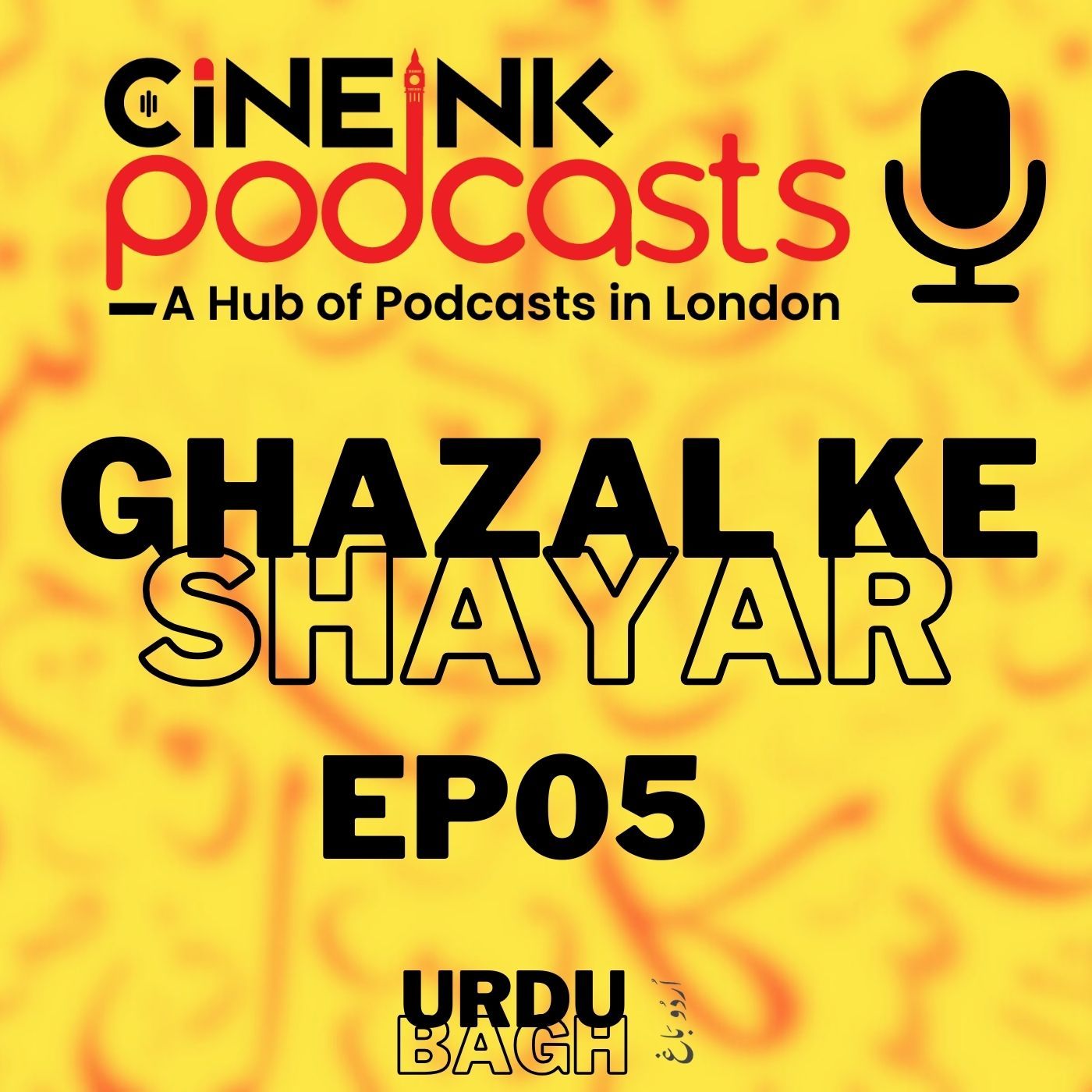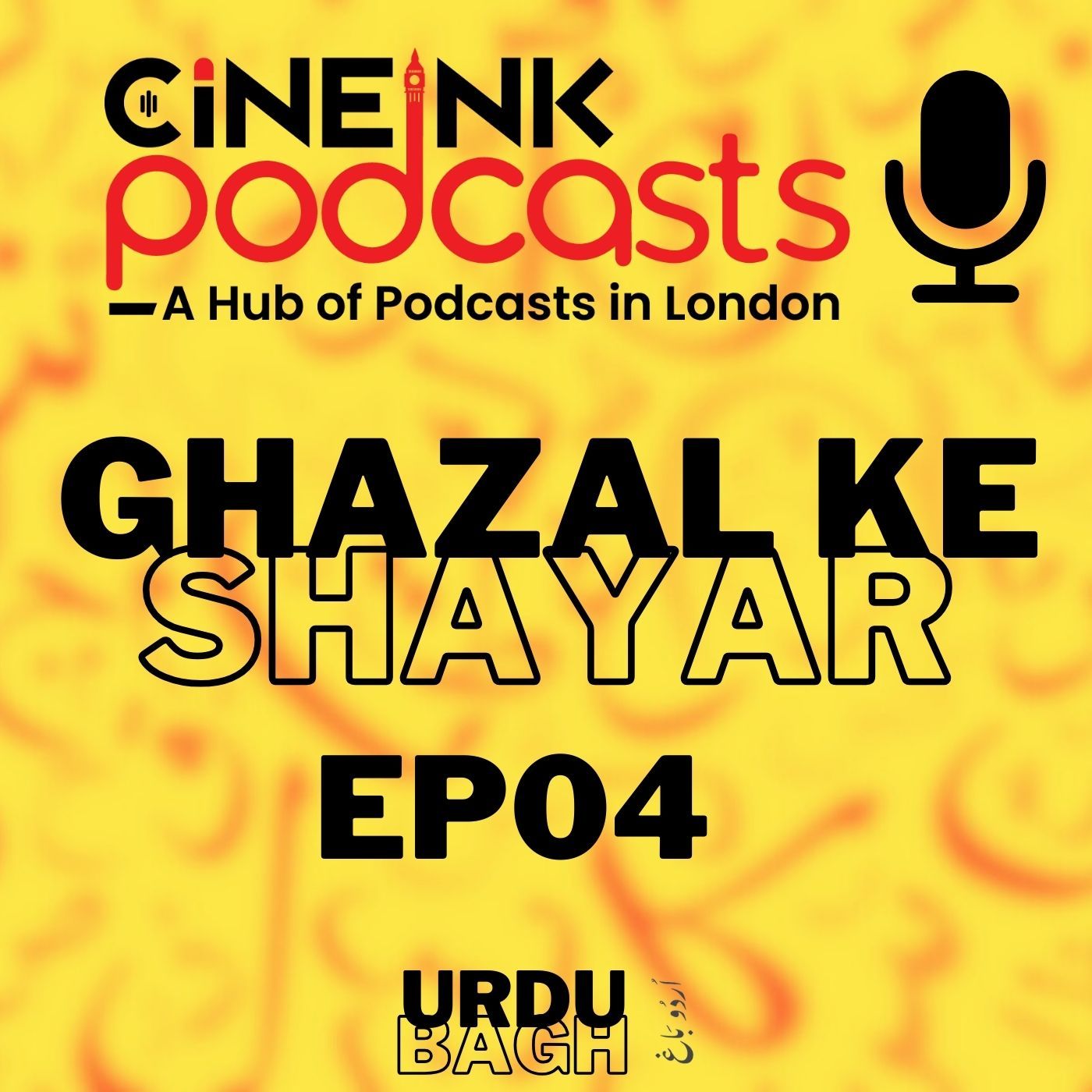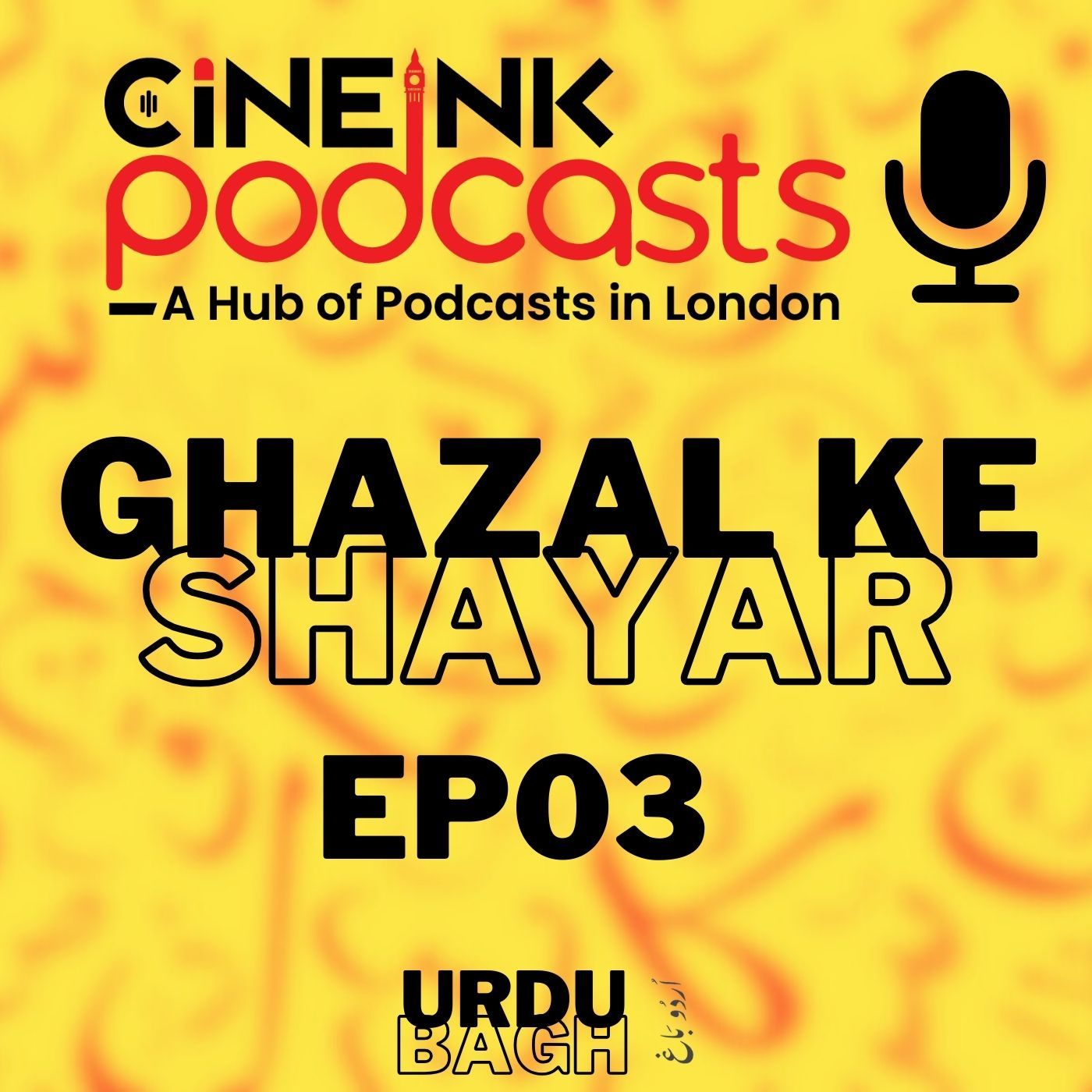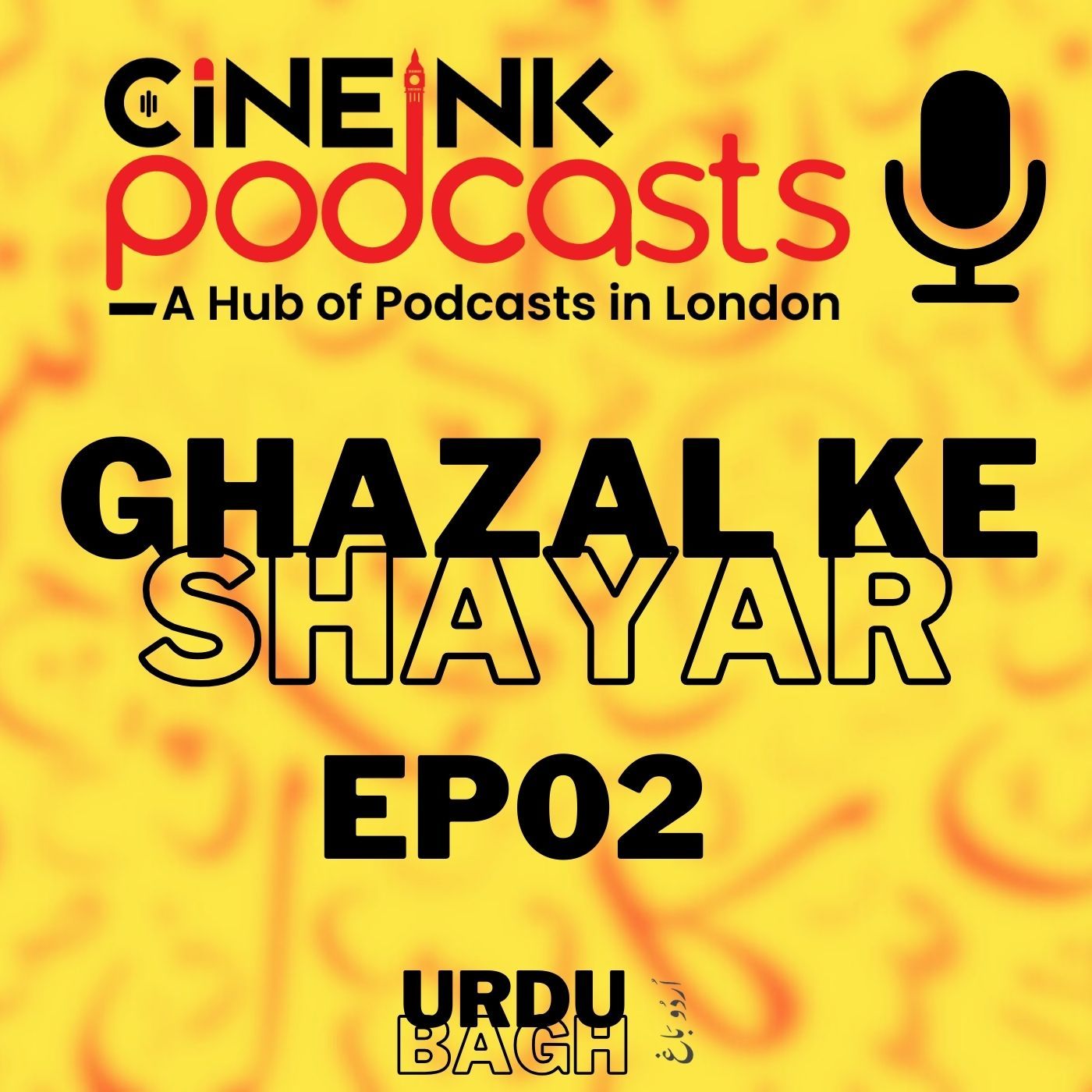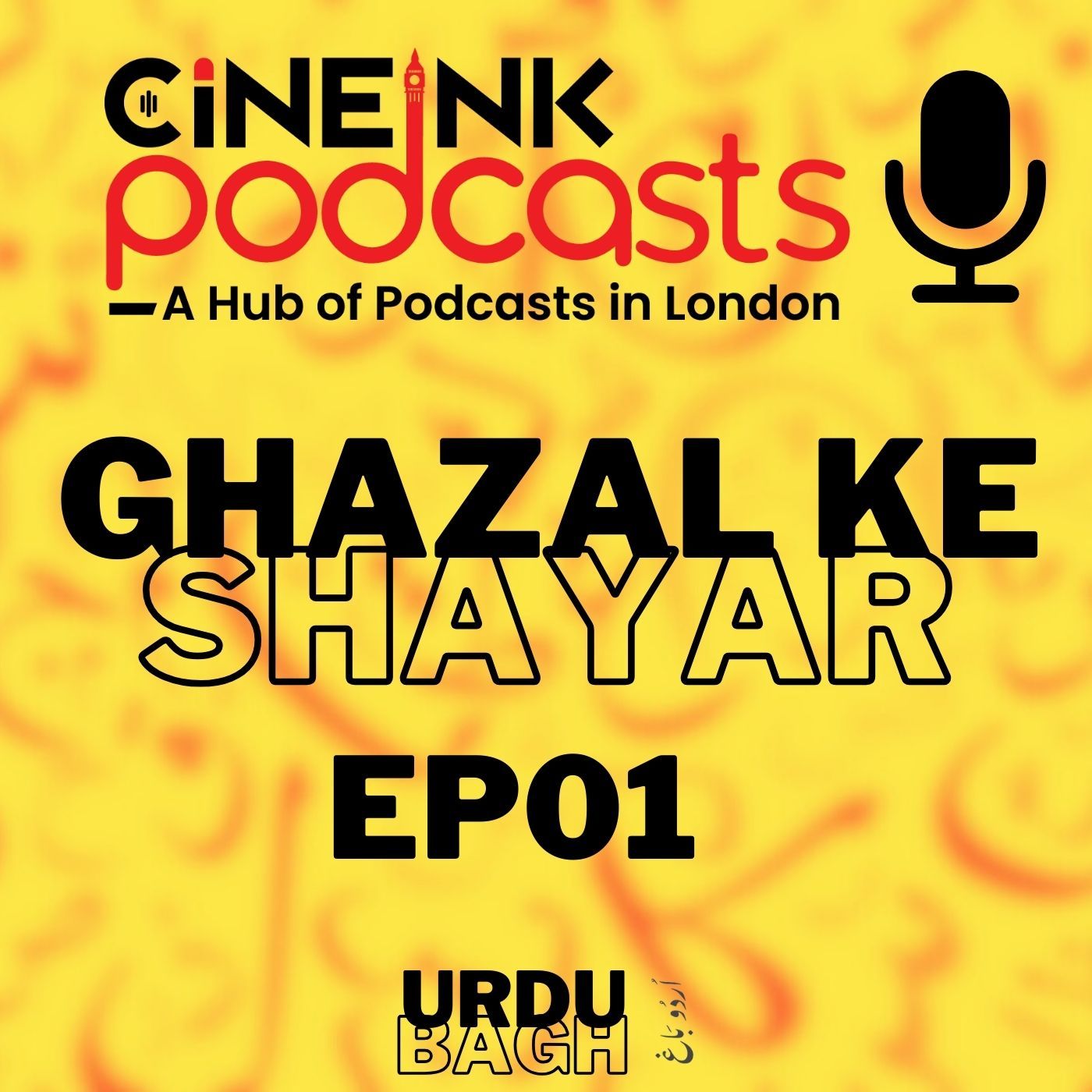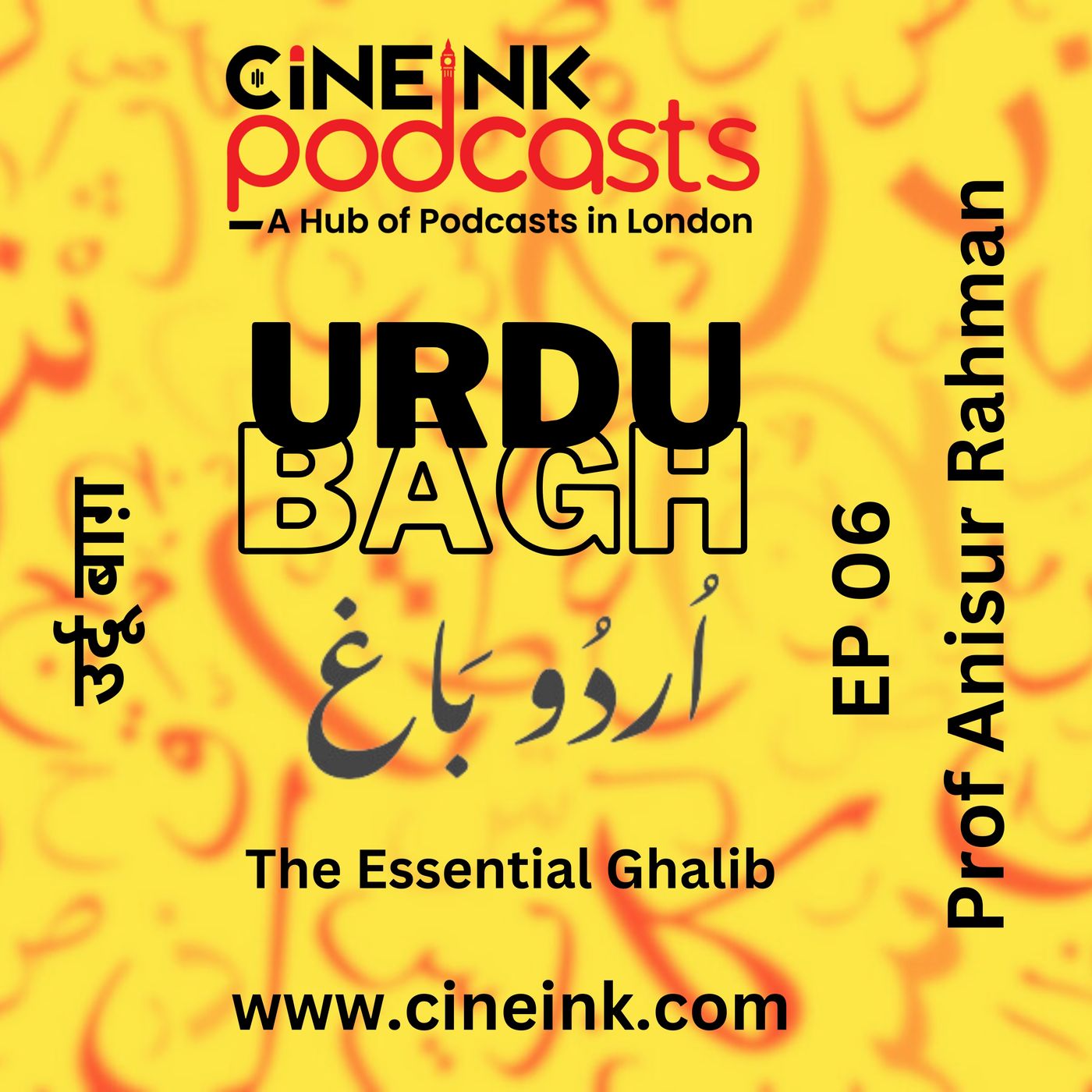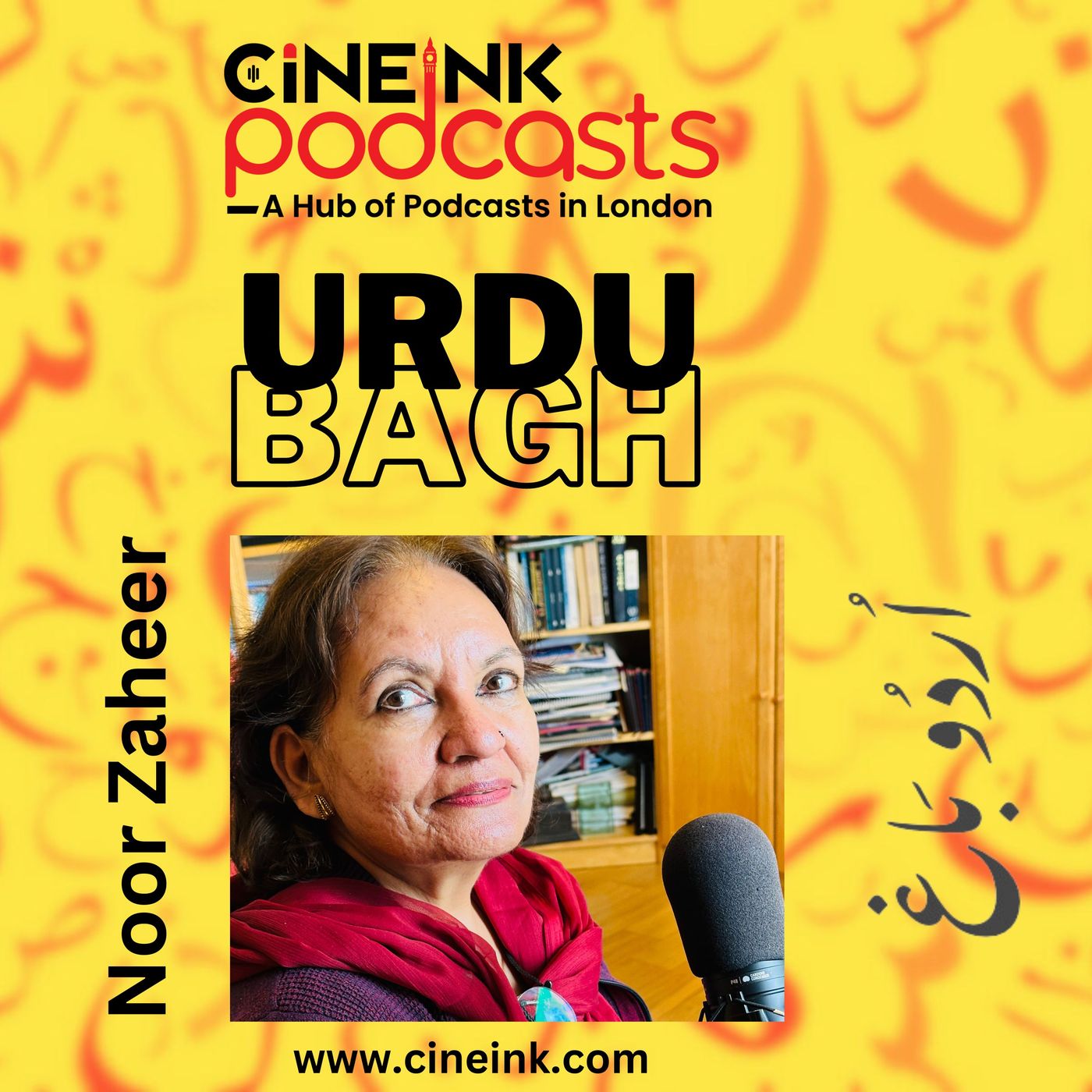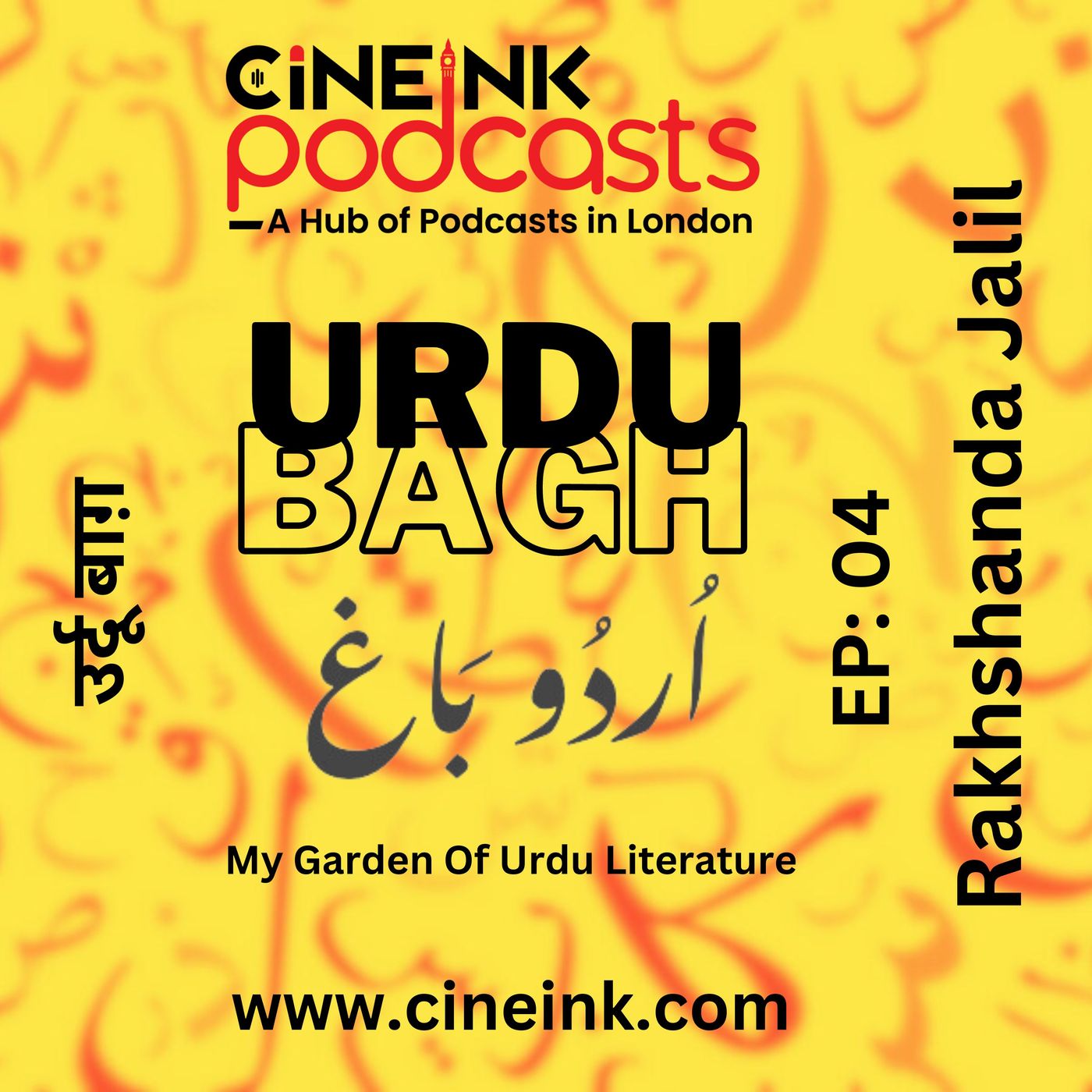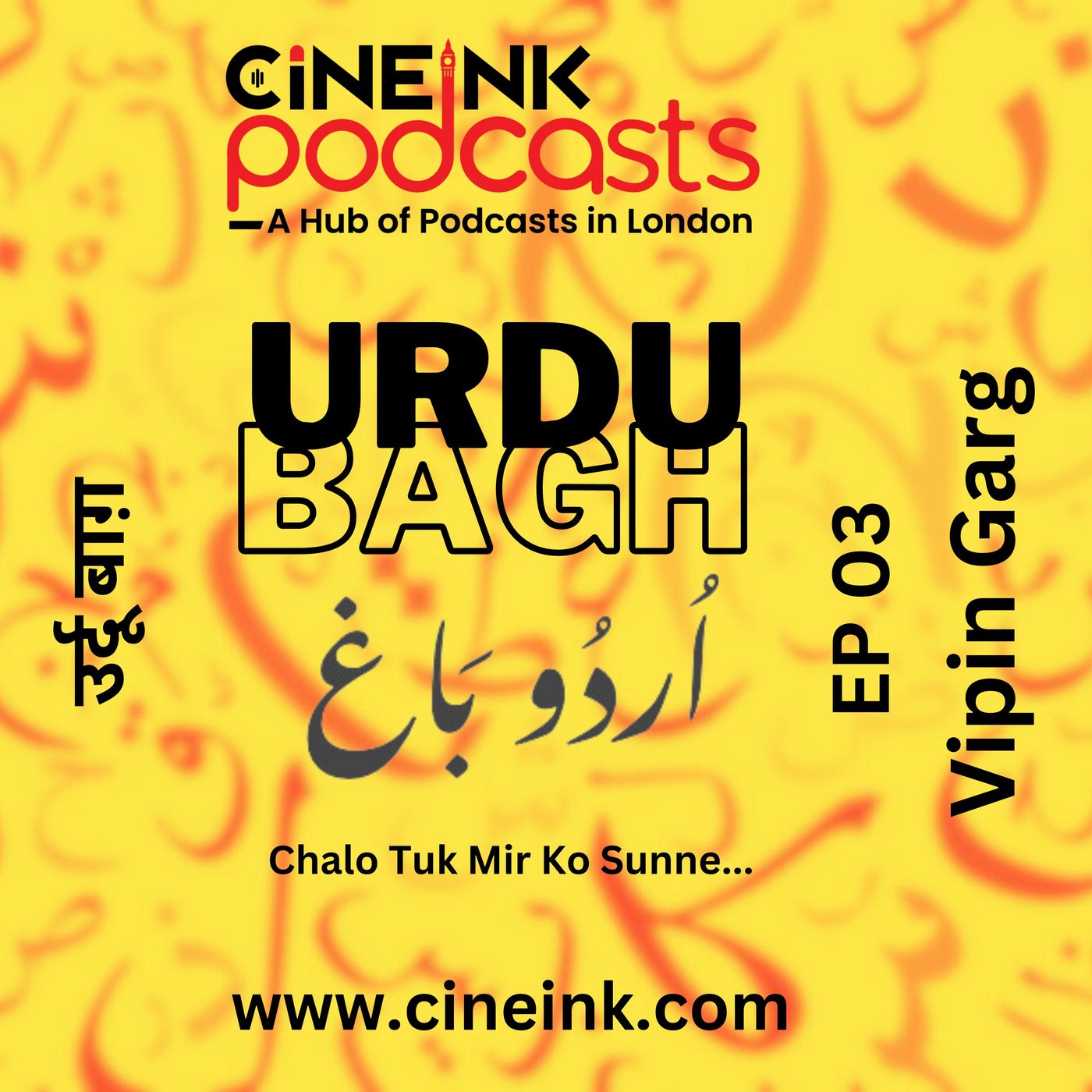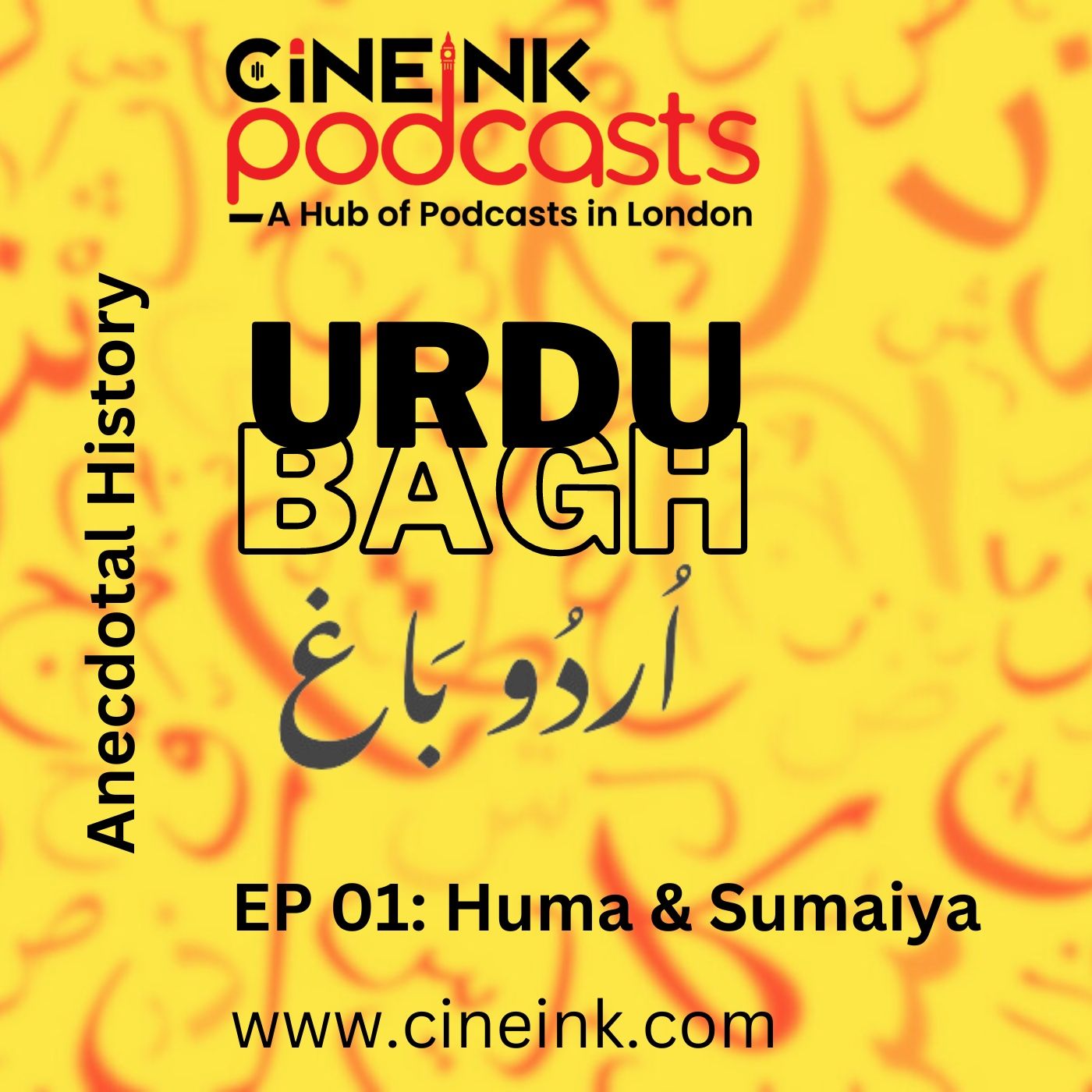Discover Urdu Bagh
Urdu Bagh

Urdu Bagh
Author: Pervaiz Alam
Subscribed: 18Played: 78Subscribe
Share
© Cine Ink Limited UK
Description
Urdu Bagh (اُردُو بَاغ - उर्दू बाग़) is a celebration of the Urdu language in its many facets. This podcast series showcases the work of Urdu legends, scholars, and activists. It also explores anecdotal history, celebrating the lives and works of Urdu’s literary giants, primarily through the memories of their family members, friends, historians, and activists.
The series ‘Urdu Bagh’ is available on all major podcast platforms. Presented and produced by Pervaiz Alam for London-based Cine Ink, a hub for podcasts in Hindi and Urdu, the series is also accessible on major social media platforms, including Twitter, Facebook, Instagram, and LinkedIn. All Cine Ink podcasts can be found on its website, www.cineink.com. You can reach us at: post@cineink.com
The series ‘Urdu Bagh’ is available on all major podcast platforms. Presented and produced by Pervaiz Alam for London-based Cine Ink, a hub for podcasts in Hindi and Urdu, the series is also accessible on major social media platforms, including Twitter, Facebook, Instagram, and LinkedIn. All Cine Ink podcasts can be found on its website, www.cineink.com. You can reach us at: post@cineink.com
12 Episodes
Reverse
Ghazal Ke Shayar, a five-episode mini-series under Cine Ink’s Urdu Bagh series, explores the evolution of Urdu ghazals from the late 16th century to the present. Based on Prof. Anisur Rahman’s book Hazaaron Khwahishein Aisi: The Wonderful World of Urdu Ghazals (HarperCollins India, 2019), the series features conversations between Prof. Rahman, a bilingual poet, translator, and former Jamia Millia Islamia professor, and broadcaster Pervaiz Alam.In this 5th and last episode of Ghazal Ke Shayar, Prof Rahman discusses Asrarul Haque Majaz, Faiz Ahmad Faiz, Moin Ahsan Jazbi, Jan Nisar Akhtar and Majrooh Sultanpuri. Prof. Anisur Rahman was awarded ‘Sahitya Akademi Translation Prize’ for “The Wonderful World of Urdu Ghazals”, an English translation of the Urdu poetry collection “Hazaaron Khwashishein Aisi”. cineinkpodcast #UrduBagh #GhazalKeShayar #hazaronkhwahisheinaisi #anisurrahman #urdupoetry #UrduPoets #sahityaakademiaward #harpercollins #Urdupodcast Presented and produced by Pervaiz Alam for London-based Cine Ink, a hub for podcasts in Hindi and Urdu, the series is also accessible on major social media platforms, including YouTube, Twitter, Facebook, Instagram, and LinkedIn. On X: @pervaizalam. All Cine Ink podcasts can be found on its website, www.cineink.com.
Ghazal Ke Shayar, a five-episode mini-series under Cine Ink’s Urdu Bagh series, explores the evolution of Urdu ghazals from the late 16th century to the present. Based on Prof. Anisur Rahman’s book Hazaaron Khwahishein Aisi: The Wonderful World of Urdu Ghazals (HarperCollins India, 2019), the series features conversations between Prof. Rahman, a bilingual poet, translator, and former Jamia Millia Islamia professor, and broadcaster Pervaiz Alam.Prof. Anisur Rahman was awarded ‘Sahitya Akademi Translation Prize’ for “The Wonderful World of Urdu Ghazals”, an English translation of the Urdu poetry collection “Hazaaron Khwashishein Aisi”. In this episode, Prof Rahman discusses Khwaja Altaf Hussain Hali, Shaad Azimabadi, Hasrat Mohani, Mohammad Iqbal, Fani Badayuni, Asghar Gondvi, Yaas Yagana Changezi, Jigar Moradabadi and Firaq Gorakhpuri. Presented and produced by Pervaiz Alam for London-based Cine Ink, a hub for podcasts in Hindi and Urdu, the series is also accessible on major social media platforms, including YouTube, Twitter, Facebook, Instagram, and LinkedIn. On X: @pervaizalam. All Cine Ink podcasts can be found on its website, www.cineink.com.
Salima Hashmi, a professor of visual art and design, painter, curator, writer, peace activist, and the eldest daughter of the renowned Urdu poet Faiz Ahmad Faiz and his British-born wife, Alys Faiz, shares anecdotes about her father and the political activism within her family. She is in conversation with broadcaster Pervaiz Alam.This podcast was recorded on 11 October 2025 before an invited audience at the Brunei Gallery, SOAS, University of London. It forms part of the 12th Faiz Peace Festival, organised by the Faiz Cultural Foundation UK in collaboration with the SOAS South Asia Institute.Salima Hashmi also unravels the mystery surrounding her birth, confirming she was born in 1942 at Lady Hardinge College Hospital in New Delhi. She recalls that her parents lived in Lodhi Colony, near the iconic Lodhi Gardens.She recounts an anecdote from when she was just eight years old, when paramilitary forces arrived at their home to arrest her father, Faiz Ahmad Faiz, in connection with the Rawalpindi Conspiracy Case of 1951. This session was dedicated to the memory of Shoaib Hashmi, the legendary producer of radio, television, and music programmes, professor of economics, political activist, and Salima Hashmi’s husband, as well as the iconic singer of the Nayyara Sings Faiz album, Nayyara Noor. Salima Hashmi shares how Nayyara Noor was deeply reluctant to appear on television.Presented and produced by Pervaiz Alam for London-based Cine Ink, a hub for podcasts in Hindi and Urdu, the series is also accessible on major social media platforms, including YouTube, Twitter, Facebook, Instagram, and LinkedIn. On X: @pervaizalam. All Cine Ink podcasts can be found on its website, www.cineink.com.
In this episode of Ghazal Ke Shayar, Prof Anisur Rahman discusses Ghalib, Momin, Mus-hafi, Insha, Zafar, Nasikh, Atish, and Dagh. Ghazal Ke Shayar, a five-episode mini-series under Cine Ink’s Urdu Bagh series, explores the evolution of Urdu ghazals from the late 16th century to the present. Based on Prof. Anisur Rahman’s book Hazaaron Khwahishein Aisi: The Wonderful World of Urdu Ghazals (HarperCollins India, 2019), the series features conversations between Prof. Rahman, a bilingual poet, translator, and former head of the English Deptt, Jamia Millia Islamia, and broadcaster Pervaiz Alam. Prof. Rahman has selected ghazal poets across seven literary periods, highlighting the genre’s rich themes—love, protest, satire, and socio-political commentary. The book, which inspires the series, includes Roman transliterations and English translations of original Urdu ghazals, preserving their rhyme and rhythm. This scholarly yet accessible series offers a concise journey through the cultural and historical significance of Urdu ghazals, making it a valuable resource for poetry enthusiasts.#Urdupodcast #ProfAnisurRahman #UrduBagh #GhazalKeShayar #cineinkpodcast #cineink #urdupoetry #urdushayri #Ghazal #500YearsOfUrduGhazal #Mushafi #InshallahKhanInsha #BahadurShahZafar #ImamBakhshNasikh #HaiderAliAtish #AsadullahKhanGhalib #MominKhanMomin #DaghDehlvi Presented and produced by Pervaiz Alam for London-based Cine Ink, a hub for podcasts in Hindi and Urdu, the series is also accessible on major social media platforms, including YouTube, Twitter, Facebook, Instagram, and LinkedIn. On X: @pervaizalam. All Cine Ink podcasts can be found on its website, www.cineink.com.
Ghazal Ke Shayar, a five-episode mini-series under Cine Ink’s Urdu Bagh series, explores the evolution of Urdu ghazals from the late 16th century to the present. Based on Prof. Anisur Rahman’s book Hazaaron Khwahishein Aisi: The Wonderful World of Urdu Ghazals (HarperCollins India, 2019), the series features conversations between Prof. Rahman, a bilingual poet, translator, and former Jamia Millia Islamia professor, and broadcaster Pervaiz Alam.In this episode, Prof Rahman discusses Mirza Mohamma Rafi Sauda, Siraj Aurangabadi, Khwaja Mir Dard and Mir Taqi Mir. Prof. Rahman has selected ghazal poets across seven literary periods, highlighting the genre’s rich themes—love, protest, satire, and socio-political commentary. The book, which inspires the series, includes Roman transliterations and English translations of original Urdu ghazals, preserving their rhyme and rhythm. This scholarly yet accessible series offers a concise journey through the cultural and historical significance of Urdu ghazals, making it a valuable resource for poetry enthusiasts. Presented and produced by Pervaiz Alam for London-based Cine Ink, a hub for podcasts in Hindi and Urdu, the series is also accessible on major social media platforms, including YouTube, Twitter, Facebook, Instagram, and LinkedIn. On X: @pervaizalam. All Cine Ink podcasts can be found on its website, www.cineink.com.
Ghazal Ke Shayar, a five-episode mini-series under Cine Ink’s Urdu Bagh series, explores the evolution of Urdu ghazals from the late 16th century to the present. Based on Prof. Anisur Rahman’s book Hazaaron Khwahishein Aisi: The Wonderful World of Urdu Ghazals (HarperCollins India, 2019), the series features conversations between Prof. Rahman, a bilingual poet, translator, and former Jamia Millia Islamia professor, and broadcaster Pervaiz Alam.In this episode, Prof Rahman discusses Quli Qutub Shah, Vali Deccani and Mazhar Jan-e-Janan. Prof. Rahman has selected ghazal poets across seven literary periods, highlighting the genre’s rich themes—love, protest, satire, and socio-political commentary. The book, which inspires the series, includes Roman transliterations and English translations of original Urdu ghazals, preserving their rhyme and rhythm. This scholarly yet accessible series offers a concise journey through the cultural and historical significance of Urdu ghazals, making it a valuable resource for poetry enthusiasts.Presented and produced by Pervaiz Alam for London-based Cine Ink, a hub for podcasts in Hindi and Urdu, the series is also accessible on major social media platforms, including YouTube, Twitter, Facebook, Instagram, and LinkedIn. On X: @pervaizalam. All Cine Ink podcasts can be found on its website, www.cineink.com.
In this episode of the Cine Ink podcast series Urdu Bagh, Professor Anisur Rahman is in conversation with broadcaster Pervaiz Alam, focussing on his latest book, The Essential Ghalib, published by HarperCollins India.The book is a compilation of the timeless poetry of Mirza Asadullah Khan Ghalib (1797–1869), one of Urdu literature’s most celebrated poets, brought to English readers. It features 200 meticulously chosen Urdu couplets, presented in their original form alongside Devanagari and Roman transliterations, literal translations, and comprehensive commentaries. Rahman’s innovative approach renders Ghalib’s intricate and profound ghazals accessible without compromising their philosophical depth, wit, or emotional resonance. The commentaries delve into the verses’ multiple meanings, cultural context, and poetic brilliance, showcasing Ghalib’s skill in weaving themes of love, life, death, and metaphysics. Presented and produced by Pervaiz Alam for London-based Cine Ink, a hub for podcasts in Hindi and Urdu, the series is also accessible on major social media platforms, including YouTube, Twitter, Facebook, Instagram, and LinkedIn. On X: @pervaizalam. All Cine Ink podcasts can be found on its website, www.cineink.com.
Noor Zaheer is a well known writer, researcher, translator and theatre activist based in London. Married to legendary broadcaster Yavar Abbas, she is the youngest daughter of legendary writers Sajjad Zaheer and Razia Sajjad Zaheer, founders of Progressive Writers Association (PWA) in the 1930s. Noor Zaheer is in conversation with broadcaster Pervaiz Alam, discussing her books, politics, PWA, Urdu’s most controversial book Angarey, Rawalpindi Conspiracy Case of 1951, leading to Indian citizenship for Zaheer. For the first time we hear an insider’s view. “My father Sajjad Zaheer and poet Faiz Ahmed Faiz were initially involved in discussions regarding leading an agitation against PM Liaquat Ali Khan’s government in Pakistan but were never a part of the Rawalpindi Conspiracy Case of 1951. They were framed,” says Noor Zaheer. Noor for the first time reveals contents of Razia Sajjad Zaheer’s unfinished novel on the life of poet Majaz. And, finally, she talks about her marriage with Yavar Abbas, who would be celebrating his 104th birthday in October, 2024.This podcast with Noor Zaheer was recorded on Saturday, 31 August, 2024, in London. Presented and produced by Pervaiz Alam for London-based Cine Ink, a hub for podcasts in Hindi and Urdu, the series is also accessible on major social media platforms, including YouTube, Twitter, Facebook, Instagram, and LinkedIn. On X: @pervaizalam. All Cine Ink podcasts can be found on its website, www.cineink.com.
Renowned writer, critic, translater and literary historian, Rakhshanda Jalil is in conversation with Pervaiz Alam. Recorded in London, the podcast 'Urdu Bagh' covers a range of topics, including memories of her Naana - the legendary Prof. Ale Ahmed Suroor, critic, academic, literary historian and poet. She fondly remembers her Naani, Zahida Suroor who used to regale children with her quintessential idioms and proverbs such as ‘main kahoon, mera kamarbund sune’. Rakhshanda Jalil talks about her maternal uncles, Siddique Ahmed Siddique and Javed Ahmed Siddiqui. But a long discussion is devoted to the controversies associated with the progressive writers movement in South Asia- a subject of her PhD: The Progressive Writers’ Movement: With Special Reference to the Urdu Literature. Rakhshanda has published over twenty books and written over fifty academic papers and essays. She shares her process of working on various books and authors. Her most recent works include translations of Baal-o-Par, a definitive collection of Gulzar’s poetry, The Sea Lies Ahead, Intizar Husain's seminal novel on Karachi and Krishan Chander's partition novel Traitor; an edited volume of critical writings on Ismat Chughtai called An Uncivil Woman; a literary biography of the Urdu poet Shahryar; The Great War: Indian Writings on the First World War; Preeto and Other Stories: The Male Gaze in Urdu and, most recently, Kaifiyat, a translation of Kaifi Azmi's poems. She runs an organisation called Hindustani Awaaz, devoted to the popularisation of Hindi–Urdu literature and culture.This interview for Urdu Bagh podcast series was recorded in London, November, 2024. Presented and produced by Pervaiz Alam for London-based Cine Ink, a hub for podcasts in Hindi and Urdu, the series is also accessible on major social media platforms, including YouTube, Twitter, Facebook, Instagram, and LinkedIn. On X: @pervaizalam. All Cine Ink podcasts can be found on its website, www.cineink.com.
Mir Taqi Mir (1723-1810) is called ‘Khuda e Sukhan’ (The God of Poetry) by Urdu scholars. To mark his 300th birth anniversary, Vipin Garg has compiled and edited a book entitled “Chalo Tuk Mir Ko Sunne” enlisting more than 8,500 couplets of Mir in Hindi, published by Rajkamal Prakashan. This is for the first time that such an ambitious work has been carried out in Devnagri script, contextualising each couplet with its meanings. The book also contains an exhaustive glossary, explaining the meanings of about 2,500 proverbs (muhavras) from Mir’s time. Vipin Garg, while growing up in the northern city of Meerut, fell in love with Mir’s poetry, and at that time he didn’t even know how to read and write the Urdu script. Garg did learn Urdu, later, and now he writes Urdu poetry as well. He has been exploring the work of Mir for the last 10 years, consisting of more than 30,000 couplets. Vipin Garg is in conversation with Mehr e Alam, Urdu scholar and Editor. This programme was recorded at Sharif Manzil, Ballimaran, Old Delhi, India, in March 2024. Once Mir and Ghalib frequented this part of the city. This podcast is also available in a video format on youtube. Urdu Bagh is a Cineink Podcast series produced by broadcaster Pervaiz Alam. Presented and produced by Pervaiz Alam for London-based Cine Ink, a hub for podcasts in Hindi and Urdu, the series is also accessible on major social media platforms, including YouTube, Twitter, Facebook, Instagram, and LinkedIn. On X: @pervaizalam. All Cine Ink podcasts can be found on its website, www.cineink.com.
Renowned broadcaster Raza Ali Abidi, formerly with the BBC Urdu Service in London, is in conversation with Pervaiz Alam, sharing his life and work on Cine Ink podcast series ‘Urdu Bagh’. Known for his hugely popular radio programmes such as Kutub Khana, Jarnaili Sadak, Sher Darya and Rail Kahani, Raza Ali Abidi, is still active on social media where he posts regularly on YouTube and Facebook, attracting hundreds of comments to his popular series ‘Lafzon Ka Safar’. Raza Ali Abidi was born in 1935 in Rookie, District Haridwar, India, but migrated to Pakistan along with his parents in 1950, where he reported for various newspapers before joining the BBC Urdu Service London in 1972. A prolific writer, Abidi has authored about 25 books, including Urdu ka Haal, Apni Awaz (short stories), Jaan Saheb (short Stories), Radio ke Din, Jaanay Pehchaaney, Malika Victoria aur Munshi Abdul Kareem, Mujhe Sab Yaad Ha and Jarnaili Sadak. His latest Urdu book ‘Begum Samru’ (September, 2023) tells the story of Farzana aka Joanna, the supreme commander of 3,000 troops, including at least a hundred European mercenaries, in the 18th-century Sardhana, India. Later, Joana was known as Begum Samru.Urdu Bagh (اُردُو بَاغ - उर्दू बाग़) is a podcast series of anecdotal history, celebrating the life and work of Urdu’s literary giants. Presented and produced by Pervaiz Alam for London-based, Cine Ink, a hub of podcasts in Hindi and Urdu languages, the series is available on all major podcast networks.Presented and produced by Pervaiz Alam for London-based Cine Ink, a hub for podcasts in Hindi and Urdu, the series is also accessible on major social media platforms, including YouTube, Twitter, Facebook, Instagram, and LinkedIn. On X: @pervaizalam. All Cine Ink podcasts can be found on its website, www.cineink.com.
Huma Khalil and Sumaiya Kamal Siddiqui are in conversation with broadcaster Pervaiz Alam. Both of them are first cousins, and daughters of eminent Urdu poets, Khaleel-Ur-Rehman Azmi and Kamal Ahmed Siddiqi, respectively. Another Urdu legend, Shahryar, is also their family. They share intimate details, memories and anecdotes associated with their fathers and Chacha, Shahryar. Khaleel-Ur-Rehman Azmi:Huma’s father, Khaleel-Ur-Rehman Azmi (1927 – 1978) of Aligarh fame is considered one of the founders of new nazm in Urdu. Scholar, Critic, Academic and poet, Azmi is widely respected for initiating a new trail in Urdu criticism with his books which are prescribed all over the world in various universities and colleges as a part of the Urdu syllabus. He is known to have taught Urdu to the legendary Urdu scholar, Prof Ralph Russel of SOAS, London. Khalil-ur-Rehman Azmi’s books include Kaghzi Pairahan, Naya Ahad Nama, Nai Nazm Ka Safar, Fikr-o-Fan, Zawiay-e-Nigah, Mazameen-e-Nau, Muqaddama-e-Kalam-e-Aatish, Taraqqi Pasand Tahreek, Urdu Mein Taraqqi Pasand Adabi Tahreek and Zindagi Ai Zindagi.Kamal Ahmed Siddiqui:Sumaiya’s father Kamal Ahmed Siddiqi (1926- 2013) was a poet, broadcaster, writer, scholar and a painter who spent most of his working life at All India Radio in Srinagar, Kashmir as a programmer. A Phd from JNU on Ghalib, Kamal Ahmed Siddiqui is known to have interviewed and recorded a large number of legendary Urdu poets of his time such as Jigar Moradabadi, Josh Malihabadi and Firaq Gorakhpuri for All India Radio and Doordarshan. He cherished his friendship with Urdu stalwarts such as Majaz, Mira Ji, Faiz Ahmad Faiz, Ali Sardar Jafri, Ale Ahmad Suroor, Khaleel-Ur-Rehman Azmi, Ehtesham Hussain, Akhtarul Iman and Showkat Siddiqui.He authored several books including Baadbaan, Jawahraat, Kohsar Gaate Hain, Intekhab, Bayaz e Ghalib: Tahqeeqi Jayaza, Urooz aur Ahang, Urooz Marooz, Kashmir Ek Manzarnama, Ghalib Ki Shanakht & Muqadma e Zaban e Urdu.SHAHRYAR:Akhlaq Mohammad Khan ‘Shahryar’ (1936 – 2012) was an academic, poet and lyricist who went on to receive the prestigious literary awards in India, Sahitya Akademi and Jnanpith, for his collection of poems, Khwab Ka Dar Band Hai.He became a household name as a film lyricist for writing songs in films such as Gaman, Umrao Jaan and Anjuman. Shahryar published his first poetry collection ‘Ism-e-azam’ in 1965, followed by other collections ‘Satvan Dar’, ‘Hijr Ke Mausam’ and 'Khwab Ka Dar Band Hai'.Urdu Bagh is a podcast series produced by Pervaiz Alam and Achala Sharma for Cine Ink, a hub of podcasts, based in London.Presented and produced by Pervaiz Alam for London-based Cine Ink, a hub for podcasts in Hindi and Urdu, the series is also accessible on major social media platforms, including YouTube, Twitter, Facebook, Instagram, and LinkedIn. On X: @pervaizalam. All Cine Ink podcasts can be found on its website, www.cineink.com.


